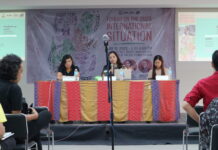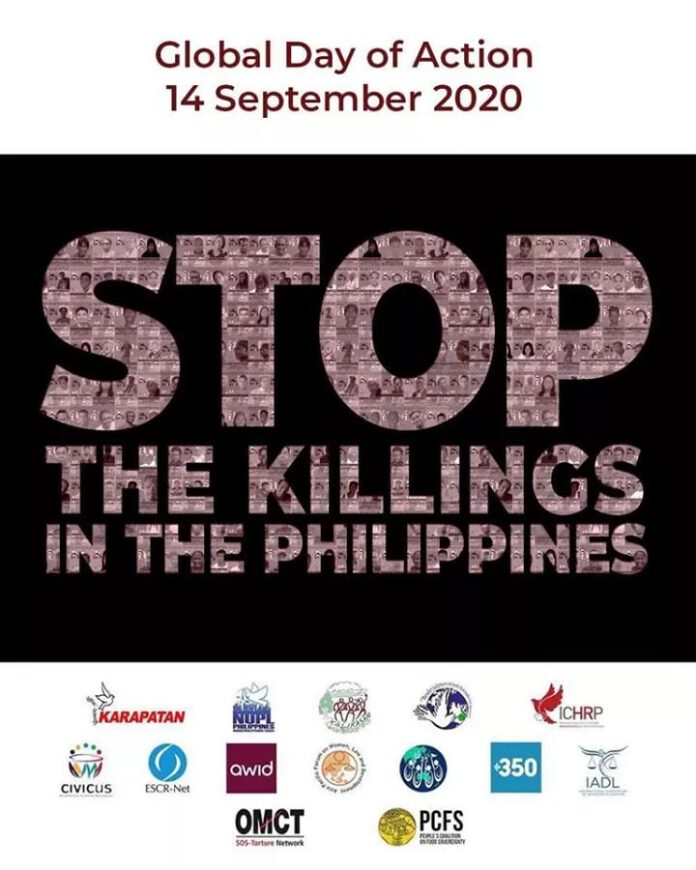As the United Nations Human Rights Council (UNHRC) opened its 45th session today, September 14, 2020, various Philippine and international human rights groups and advocates called on the UNHRC to “exercise its mandate and urgently create an independent and impartial investigative mechanism on the rampant extrajudicial killings and human rights violations” in today’s Global Day of Action following the spate of killings of several activists and human rights defenders over the past months.
In a collective statement signed by more than 700 organizations and individuals, including women’s rights organizations, social activists, civil libertarians, lawyers, religious leaders, and environmental and land rights defenders all over the world, the groups asserted the call for an international investigation on the human rights situation in the country because of the “fruitlessness and ineffectiveness” of domestic measures in exacting accountability for these killings and other human rights abuses.
“We have witnessed a long history of domestic inter-agency task forces and fact-finding commissions promising to act without fear or favor. But we repeatedly have been frustrated and even enraged by the fruitlessness and ineffectiveness of these so-called domestic accountability measures. Rather than help, these government bodies have even contributed to the infrastructure of impunity and miscarriage of justice against the victims of human rights violations,” the statement read.
Signatories of the statement — which include global human rights organisations and movements Civicus, the International Network for Economic, Social and Cultural Rights (ESCR-Net), Association of Women’s Rights in Development (AWID), International Association of Democratic Lawyers (IADL), Asia Pacific Forum on Women, Law and Development (APWLD), World Organisation Against Torture (OMCT), People’s Coalition for Food Sovereignty (PCFS), International Coalition Against Enforced Disappearances (ICAED), Women’s Global Network for Reproductive Rights, Education International – Asia Pacific, Public Services International – Asia Pacific, Pesticide Action Network – Asia Pacific and rights groups from 38 countries — said that “the human rights situation in the Philippines took a turn for the worse,” citing the signing and enactment of the Anti-Terrorism Act which is “seen as a measure that will aggravate the attacks and vilification of human rights defenders and civil society” as well as the killings of peasant leader Randall Echanis and health activist Zara Alvarez in August, following the killings of relief worker Jory Porquia, peasant leader Nora Apique and urban poor leader Carlito Badion amid the imposition of lockdowns to combat the COVID-19 pandemic and continuing killings linked to the government’s bloody campaign against illegal drugs.
“We must put a stop to these unrelenting attacks now. And this worsening situation would not end as long as those who perpetrate them run free and unscathed. These perpetrators must be brought to justice before any court, tribunal or body that will act independently, with impartiality, and effectively, having allegiance to human rights and justice instead of powers that be. We need true accountability and genuine transparency in the inquiry into these human rights violations, removing the possibility that investigations would only shield and even absolve the persons liable for the crimes,” they asserted in the statements sent to member and observer States in the UN Human Rights Council.
In Quezon City, human rights activists unfurled a big “Stop the Killings” banner in Liwasang Diokno at the Commission on Human Rights compound. The hashtags #StopTheKillingsPH #HRC45 were used by individual advocates on Facebook and Twitter. Prior to September 14, human rights lawyers in Turkey conducted protest actions in several cities in their country to support the call, while rights advocates in Switzerland held a protest action in Bern.
During the online program in the afternoon, UN Special Rapporteurs Agnes Callamard (on extrajudicial, summary or arbitrary killings), Diego Garcia Sayan (on independence of judges and lawyers), David Boyd (on human rights and the environment), and Mary Lawlor (on the situation of human rights defenders) delivered solidarity messages.
Three members of the European Parliament – Hannah Neumann (Alliance 90/The Greens, Germany), Marc Botenga (Workers’ Party of Belgium) and Pernando Barrena (EH Bildu Coalition-Basque Political Party) – expressed the need to look into the situation in the Philippines and for European Union member states to act on this human rights crisis. Australian senators Janet Rice (Green Party) and Labor party senators Tim Ayres and Louise Pratt called on the Australian government and members of the UN HRC to investigate the situation in the Philippines. Basque member of parliament Oihanna Etxebarrieta of the EH Bildu Coalition-Basque Political Party expressed her solidarity against extrajudicial killings in the Philippines.
The Global Day of Action was organized by Karapatan, the National Union of Peoples’ Lawyers, Kalikasan People’s Network for the Environment, 350.org Pilipinas, the Ecumenical Voice for Human Rights and Peace in the Philippines, Civicus, ESCR-Net, AWID, IADL, APWLD, the Asia Pacific Network of Environment Defenders, the International Coalition for Human Rights in the Philippines, PCFS, and OMCT.
Read the full collective statement here.


















